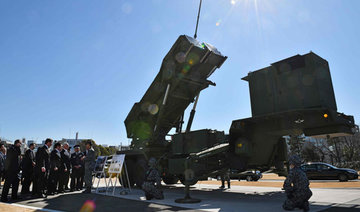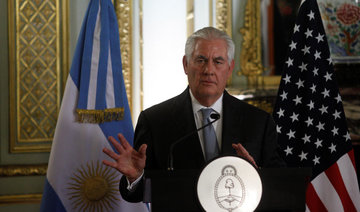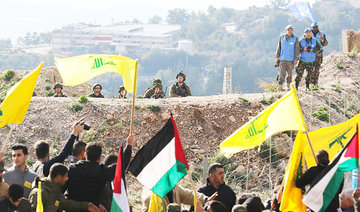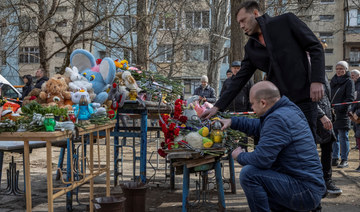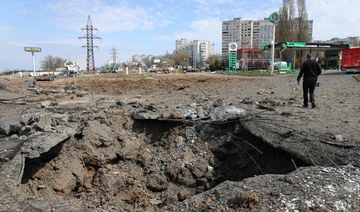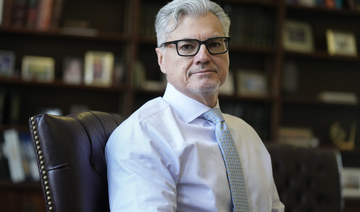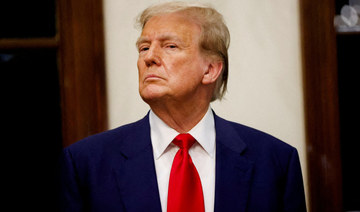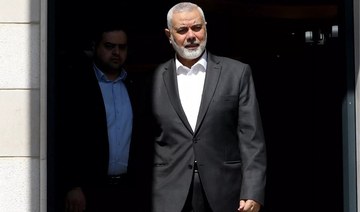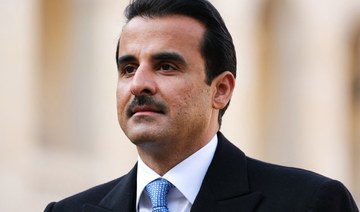TOKYO: Washington will soon unveil its “toughest sanctions ever” on North Korea, US Vice President Mike Pence said Wednesday, adding that the Pyongyang regime would not be allowed to “hijack” the upcoming Olympics.
Speaking in Japan before attending the opening ceremony of the Winter Games in South Korea, Pence pledged that Washington would “intensify its maximum pressure campaign” on the North, working with Tokyo.
“I’m announcing today that the United States will soon unveil the toughest and most aggressive round of economic sanctions on North Korea ever,” he said, without giving further details.
Pence’s three-day visit to Japan came as Washington seeks to bolster ties with its allies in the region and maintain pressure on the regime in Pyongyang despite a recent thaw on the peninsula.
“All options are on the table and the US has deployed some of our most advanced military assets to Japan and the wider region to protect our homeland and our allies and we will continue to,” Pence vowed.
To highlight what Washington calls the regime’s human rights “abuses,” the vice president will attend the opening ceremony of the Pyeongchang Olympics with the father of the late former North Korea prisoner Otto Warmbier.
The US and North Korea have been locked in a fierce war of words, with US President Donald Trump mocking North Korean leader Kim Jong-Un as “rocket man” and the young dictator threatening to rain nuclear destruction on the United States.
Kim has taken a more conciliatory tone in 2018, calling for detente with the South Koreans and accepting an invitation for his country to participate in what is being billed as the “peace Olympics.”
The two Koreas held a rare high-level meeting last month and the North’s ceremonial head of state is due to arrive Friday, the highest-ranking Pyongyang official ever to visit the South.
Nevertheless, the situation on the peninsula remains tense and it is unclear how long any respite in tensions will last after the Games, especially when the US and the South resume their delayed joint annual military exercises — a perennial irritant for Pyongyang.
But US Defense Secretary Jim Mattis on Wednesday rebuffed suggestions that the odds of war with North Korea had risen under Trump’s presidency, insisting the focus was resolutely on diplomacy.
“As far as the situation with Korea, it is firmly in the diplomatic lane,” Mattis told reporters at the White House, when asked if the prospect of conflict with Pyongyang was any nearer than when Trump took office a year ago.
“We have seen much stronger diplomatic action,” Mattis said, citing a recent string of unanimously adopted UN Security Council resolutions aimed at ramping up the pressure on the Kim regime.
For his part, Abe said that Japan and the US had “confirmed... that we can never accept a nuclear-armed North Korea.”
“I appreciate the North-South talks toward the success of the Pyeongchang Olympics. But on the other hand, we must squarely face the fact that North Korea continues to pursue nuclear and missile programs,” the Japanese leader said.
Abe added that the allies would urge other countries not to be “captivated by the charm offensive of North Korea.”
“A major military parade is expected in Pyongyang tomorrow. Provocative actions are continuing,” he said.
En route to Japan, Pence declined to rule out a meeting with the North Korean delegation also attending the opening ceremony, offering the faintest hope of a diplomatic breakthrough.
“I have not requested a meeting, but we’ll see what happens,” Pence said during a stop in Alaska.
However, he appeared to take a tougher line in Tokyo, saying that North Korea must not be allowed to “hijack the message and imagery of the Olympic Games.”
“We will not allow North Korea to hide behind the Olympic banner the reality that they enslave their people and threaten the wider region,” he said.
In contrasting comments, Pope Francis on Wednesday praised the Olympic rapprochement.
“The traditional Olympic truce this year takes on special importance,” he said at his weekly general audience.
“This gives us hope of a better world where conflicts are resolved peacefully through dialogue and mutual respect, as sport also teaches us.”
Earlier Wednesday, Pence inspected Japan’s missile defense system and stressed the “unwavering” commitment to what he called a “critical” alliance.
He will address troops at a US air base outside Tokyo on Thursday before heading on to South Korea.
Mike Pence announces ‘toughest’ US sanctions on North Korea
Mike Pence announces ‘toughest’ US sanctions on North Korea
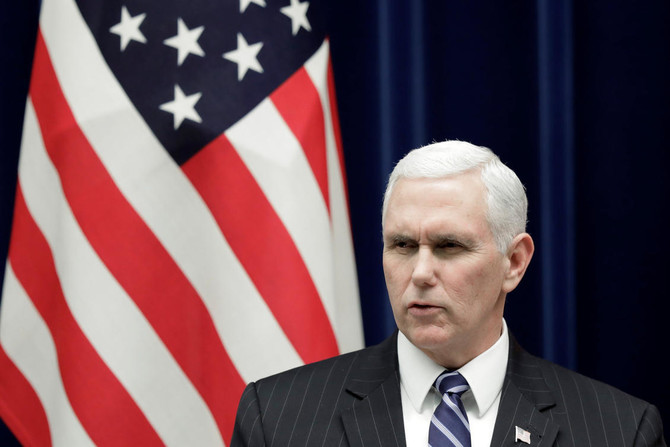
Sunak says UK to raise defense spending amid global threats
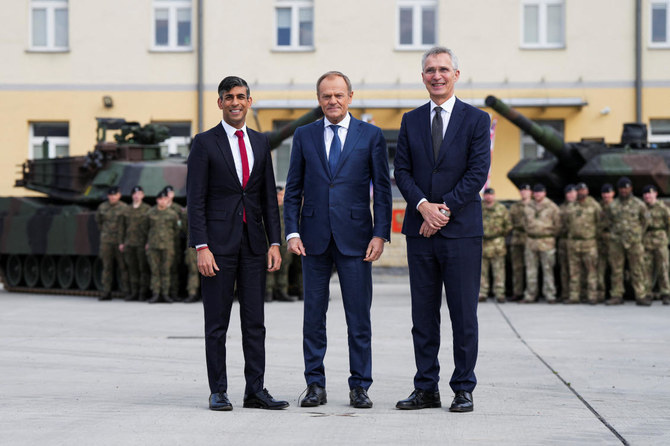
The increase in spending from 2.3 percent will see the UK become one of the highest spenders on defense in the 32-member defense alliance
WARSAW: Britain will raise defense spending to 2.5 percent of GDP by 2030 in a “most dangerous” world, Prime Minister Rishi Sunak said Tuesday during a visit to Poland.
The commitment came as NATO countries face pressure to raise defense spending in the face of global threats, particularly from Russia.
“In a world that is the most dangerous it has been since the end of the Cold War, we cannot be complacent,” Sunak told reporters in Warsaw, where he held a press conference with NATO Secretary-General Jens Stoltenberg.
The increase in spending from 2.3 percent will see the UK become one of the highest spenders on defense in the 32-member defense alliance after the United States, the British government said.
It means the UK is expected to spend £87 billion on defense in 2030-31, an increase of £23 billion over current levels.
“I believe we must do more to defend our country, our interests, and our values,” Sunak said, announcing “the biggest strengthening of national defense for a generation.”
Western nations are under pressure to boost defense funding following Moscow’s invasion of its neighbor Ukraine as well as the threat of escalation in the Middle East.
EU chief Ursula von der Leyen recently called for a “European awakening on defense and security.”
Brussels is set to come up with more proposals for financing the defense push by a summit of EU leaders in June.
Sunak has also faced calls from his Conservative Party to boost defense spending, with some calling for a level of three percent of GDP.
On Tuesday, Sunak also announced £500 million additional funding for Ukraine’s war effort against Russia.
A Russian strike on Kharkiv’s TV tower is part of an intimidation campaign, Ukraine’s Zelensky says

- Kharkiv region straddles the approximately 1,000-kilometer front line where Ukrainian and Russian forces have been locked in battle for more than two years
- “Four priorities are key: defense of the sky, modern artillery, long-range capacity, and to ensure that packages of American aid arrive as soon as possible,” Zelensky said
KYIV: Ukrainian President Volodymyr Zelensky said a Russian missile strike that smashed a prominent skyline television tower in Kharkiv was part of the Kremlin’s effort to intimidate Ukraine’s second-largest city, which in recent weeks has come under increasingly frequent attack.
The strike sought to “make the terror visible to the whole city and to try to limit Kharkiv’s connection and access to information,” Zelensky said in a Monday evening address.
The northeastern Kharkiv region straddles the approximately 1,000-kilometer (600-mile) front line where Ukrainian and Russian forces have been locked in battle for more than two years since Moscow’s full-scale invasion of Ukraine. The front line has changed little during a war of attrition, focused mostly on artillery, drones and trenches.
Since late March, Russia has stepped up the pressure on Kharkiv, apparently aiming to exploit Ukraine’s shortage of air defense systems. It has pounded the local power grid and hit apartment blocks.
On Monday, a Russian Kh-59 missile struck Kharkiv’s 250-meter (820-foot) -high TV tower, breaking it roughly in half and halting transmissions.
A Washington think tank said Russia may be eyeing a ground assault on Kharkiv.
“The Kremlin is conducting a concerted air and information operation to destroy Kharkiv City, convince Ukrainians to flee, and internally displace millions of Ukrainians ahead of a possible future Russian offensive operation against the city or elsewhere in Ukraine,” the Institute for the Study of War said in an assessment.
The expected arrival in Ukraine in coming weeks of new military aid from its Western partners possibly has prompted Russia to escalate its attacks before the help arrives, the ISW said, adding that trying to capture Kharkiv would be “a significant challenge” for the Kremlin’s forces.
Instead, the Russian military command “may attempt to destroy Kharkiv City with air, missile, and drone strikes and prompt a large-scale internal displacement of Ukrainian civilians,” it said.
The US Senate was returning to Washington on Tuesday to vote on $61 billion in war aid to Ukraine after months of delays. Zelensky said US President Joe Biden assured him the aid would include long-range and artillery capabilities.
“Four priorities are key: defense of the sky, modern artillery, long-range capacity, and to ensure that packages of American aid arrive as soon as possible,” Zelensky said.
Also Tuesday, Britain pledged 500 million pounds ($620 million, 580 million euros) in new military supplies for Ukraine, including 400 vehicles, 60 boats, 1,600 munitions and 4 million rounds of ammunition.
The shipment will also include British Storm Shadow long-range missiles, which have a range of about 150 miles (240 kilometers) and have proven effective at hitting Russian targets, the British government said.
British Prime Minister Rishi Sunak spoke with Zelensky on Tuesday morning to confirm the new assistance. He was due to announce the aid later Tuesday during a visit to Warsaw where he was meeting with Polish Prime Minister Donald Tusk and NATO Secretary General Jens Stoltenberg.
Less cheering news came from the European Union, however. EU countries that have Patriot air defense systems gave no clear sign Monday that they might be willing to send them to Ukraine, which is desperately seeking at least seven of the missile batteries.
Ukraine’s army is also heavily outnumbered in the fight, and expanding the country’s mobilization has been a delicate issue.
Ukrainian Foreign Minister Dmytro Kuleba on Tuesday signaled that authorities plan to clamp down on young men of conscription age who have moved abroad, with details of the specific measures to be made public soon.
“Staying abroad does not relieve a citizen of his or her duties to the homeland,” Kuleba said on the social media platform X.
Meanwhile, Russia launched 16 Shahed drones and two Iskander-M ballistic missiles over Ukraine’s southern and central regions, the Ukrainian air force said Tuesday morning. It said all but one of the drones were intercepted.
In Odesa, an overnight attack injured nine people, regional Gov. Oleh Kiper said. Among those injured were two infants and two children aged nine and 12, Kiper said. City mayor Hennadii Trukhanov said 58 apartments in 22 buildings were damaged.
In other developments:
A Russian missile strike near Dnipro, Ukraine’s fourth-largest city, injured four people who were admitted to hospital, regional Gov. Serhii Lysak said.
Russian forces dropped a guided aerial bomb in Kostiantynivka, a city in the eastern Donetsk region, injuring five people who were riding in a car, police said. Two of them were in critical conditions.
Trump to meet with senior Japanese official after court session Tuesday in hush money trial
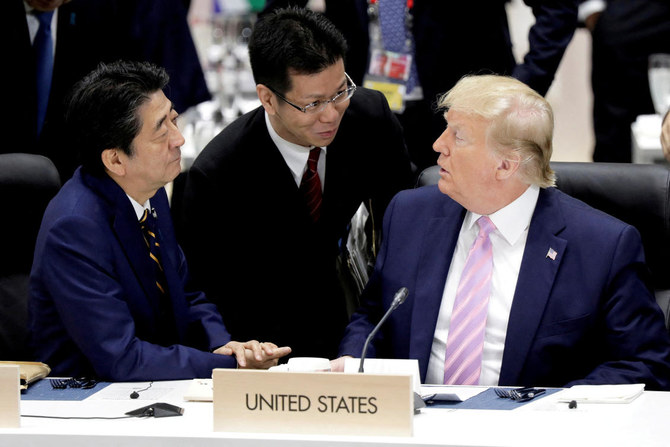
- “Leaders from around the world know that with President Trump we had a safer, more peaceful world,” said Trump spokesperson Brian Hughes
- Trump met last week with Polish President Andrzej Duda at Trump Tower and also met recently with British Foreign Secretary David Cameron and Hungarian Prime Minister Viktor Orbán
WASHINGTON: Former President Donald Trump is meeting with another foreign leader while he’s in New York for his criminal hush money trial.
The presumptive GOP nominee will host former Japanese Prime Minister Taro Aso at Trump Tower Tuesday, according to two people familiar with the plans who spoke on condition of anonymity because they had not been formally announced.
Aso is just the latest foreign leader to spend time with Trump in recent weeks as US allies prepare for the possibility that he could win back the White House this November.
“Leaders from around the world know that with President Trump we had a safer, more peaceful world,” said Trump spokesperson Brian Hughes in a statement. “Meetings and calls from world leaders reflect the recognition of what we already know here at home. Joe Biden is weak, and when President Trump is sworn in as the 47th President of the United States, the world will be more secure and America will be more prosperous.”
Trump met last week with Polish President Andrzej Duda at Trump Tower and also met recently with British Foreign Secretary David Cameron and Hungarian Prime Minister Viktor Orbán.
Trump was close with Shinzo Abe, the former Japanese prime minister who was assassinated in 2022. Aso is vice president of the Japanese Liberal Democratic Party and also served as deputy prime minister and finance minister under Abe.
Trump has threatened to impose broad new tariffs if he wins a second term.
Early Tuesday morning, he complained about the US dollar reaching a new high against the Japanese yen, calling it “a total disaster for the United States.”
“When I was President, I spent a good deal of time telling Japan and China, in particular, you can’t do that,” he wrote on his Truth Social platform. “It sounds good to stupid people, but it is a disaster for our manufacturers and others.”
The US dollar is trading at above 150 yen recently, up from 130-yen mark a year ago, which has made it more costly for Japan to import goods but has boosted exports.
President Joe Biden hosted current Japanese Prime Minister Fumio Kishida at the White House for talks and a state dinner earlier this month. During the visit, the leaders announced plans to upgrade US-Japan military relations, with both sides looking to tighten cooperation amid concerns about North Korea’s nuclear program and China’s increasing military assertiveness in the Pacific.
Bangladesh, Qatar sign 10 cooperation deals during emir’s first Dhaka trip
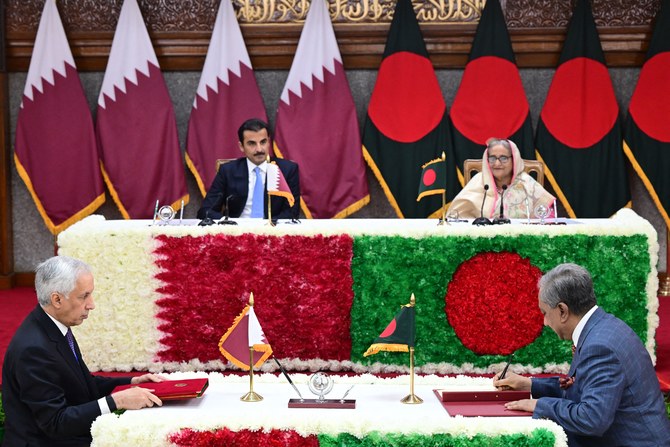
- Agreements cover investment, maritime transport and establishment of joint business council
- Bangladeshi president invited Qatar’s emir to invest in the country’s special economic zones
DHAKA: Bangladesh and Qatar signed 10 cooperation agreements on Tuesday as the Gulf state’s Emir Sheikh Tamim bin Hamad Al-Thani made his first official visit to Dhaka.
Prime Minister Sheikh Hasina and Sheikh Tamim witnessed the signing ceremony, which covered deals on investment, maritime transport, taxation, legal affairs and the establishment of a Bangladesh-Qatar joint business council.
The two countries also signed several memoranda of understanding, including on diplomatic training, education, labor, youth and sports, as well as port management cooperation.
Sheikh Tamim then held a meeting with President Mohammed Shahabuddin as part of his visit to Bangladesh, which is the second stop in the emir’s Asia tour that began in the Philippines on Sunday.
During their talks, Shahabuddin invited Qatar to invest in Bangladesh’s special economic zones.
“Bangladesh will welcome investments in various sectors including in state-led food supply chains from production to consumption such as agro-production and processing, food packaging, smart agriculture and fertilizer production,” Shahabuddin’s press secretary Joynal Abedin told reporters after the meeting.
“Qatar investors can get massive incentives and support in sectors like petrochemicals, energy, machineries, information technology, electronics, ceramics, agri-business, and food processing in Bangladesh.”
Shahabuddin also urged Sheikh Tamim to recruit more skilled workers from Bangladesh during their talks, Abedin said.
Qatar is currently the largest supplier of liquefied natural gas to Bangladesh. Earlier this year, the emirate signed a 15-year agreement with the US-based Excelerate Energy to supply 1 million metric tons per year of LNG to Bangladesh starting from January 2026.
The Gulf state is also home to about 400,000 Bangladeshis who live and work there, as it is one of the preferred destinations for migrant workers from the South Asian country.
India’s Modi calls rivals pro-Muslim as election campaign changes tack
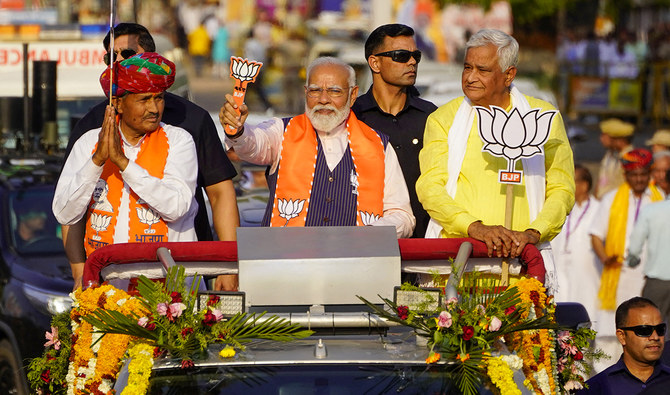
- Modi has accused Congress of having an election plan to redistribute wealth of Hindus among Muslims
- Modi’s government has repeatedly been accused of discrimination against India’s estimated 200 million Muslims
NEW DELHI: Indian Prime Minister Narendra Modi and his Hindu nationalist party have begun attacking opposition rivals, saying they favor minority Muslims, in what analysts see as a bid to invigorate their hard-line base after general elections began last week.
India began voting on Friday in a seven-phase election at which Modi seeks a rare third consecutive term, with campaigning that had so far largely focused on his record of growth and welfare as well as his personal popularity.
But in a speech on Sunday, Modi referred to Muslims as “infiltrators” who have “more children,” linking the comment to what he called an election plan of the main opposition Congress party to redistribute the wealth of Hindus among Muslims.
The Congress denied making any such promise and petitioned the Election Commission to act against Modi, who surveys suggest will win a comfortable majority, though analysts say his party wants to avert possible voter fatigue and overconfidence.
The controversial remarks were an unusual “deviation” from Modi’s usual practice as he rarely targets Muslims directly, said Hilal Ahmed, a political analyst at Delhi’s Center for the Study of Developing Societies.
They followed low voter turnout in areas where the BJP had done well in 2019, he added.
“The low turnout simply means that the committed BJP voter has not yet come out,” Ahmed said. “They obviously want the committed voter to come out. That is the reason for this deviation.”
The comment on redistribution of wealth to Muslims was supported and amplified on Monday by BJP members, including Modi’s powerful cabinet colleague, Home Minister Amit Shah, who mentioned it in a campaign speech.
Modi aired the claim again on Tuesday, a day after speaking about the gains Muslims have made during his 10-year rule.
In the southern state of Karnataka, half of which votes on Friday in the second phase of elections, BJP members have staged protests against last week’s murder of a Hindu woman by a Muslim man.
They say the incident is an instance of “love jihad,” a term Hindu groups use to accuse Muslim men of waging a campaign that lures Hindu women to convert to Islam with promises of marriage.
EXPOSING OPPOSITION, BJP SAYS
Modi’s government has repeatedly been accused of targeting and discrimination against India’s estimated 200 million Muslims, who form the world’s third-largest Muslim population.
The government has denied all accusations, and Modi has said he works for the betterment of all.
“Stating facts and exposing the flawed strategy of the opposition is our job,” BJP president J.P. Nadda told Reuters, when asked about Modi’s weekend comments.
But he said the BJP remained committed to its slogan of betterment, underlining reforms pushed by Modi’s government to help Muslim women and the poor among the community.
Another senior BJP leader and member of the party’s central election panel said Modi’s Sunday comments should not be seen as “polarizing,” as he had only reminded voters about the “Muslim-first strategy” of Congress and its allies.
He spoke on condition of anonymity as he was not authorized to speak to the media.
In January, Modi inaugurated a grand temple to the Hindu god-king Lord Ram on a once-disputed site believed to be his birthplace, fulfilling a longstanding promise projected by the BJP as a symbol of Hindu rejuvenation.
In campaign speeches Modi refers to the temple, but he has focused more on his development and welfare record and national pride to counter the opposition focus on joblessness, price rise and rural distress in the world’s fastest growing major economy.
“When the campaign started, the focus was entirely on development, welfare, reaching out to marginalized people and Hindutva came last,” said analyst Ahmed, referring to the Hindu nationalism espoused by the BJP.
“After the first phase, they realized they need to go back to their own voters ... back to the basics.”


